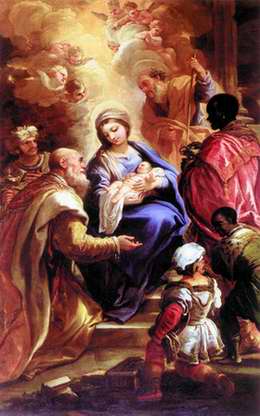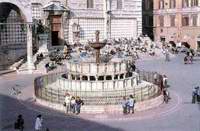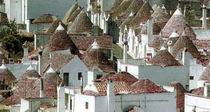Paolo Bruni
Born in Naples on January 23, 1941.
University of Naples: degree in Law.
Military service as reserve officer with the rank of lieutenant.
 Question: Could you give us a briefing Italy mainly her history, culture, sightseeing, current situation and the special feature? Question: Could you give us a briefing Italy mainly her history, culture, sightseeing, current situation and the special feature?
Answer: Italy is situated on the southern border of Europe and her peninsula, with surrounding islands, reaches almost to the coast of Africa. Just because of this geographical position, Italy has direct contact with the main ethnic and cultural areas of the Old World (neo-Latin, Germanic and Slav-Balkan) as well as, through the North Africa countries, with the world of Arab-Islamic civilization.
Consequently, while remaining firmly anchored in the world of western or European civilization, which was the direct heir of the Graeco-Roman culture that developed and flourished on this very peninsula for over a millennium, Italy seems to stretch out naturally towards the opposite shore of the Mediterranean, practically dividing its western and eastern basins. Thus Italy can be considered the most logical link between Europe and the peoples of Africa and Asia, bordering as they do on the same sea and sharing over many centuries both historical events and cultural influences.
Still today, with the present international situation of unrest and open conflict in some Mediterranean areas, Italy, with her renewed productivity and a policy of peaceful co-existence with all countries, provides a source of stability and moderation within the political context of this part of the Old World.
The economic development of a nation, though rich in tradition, history and culture, as Italy certainly is, assumes greater significance only when accompanied by substantial progress in general social conditions, through greater redistribution of wealth, and thus by availability of resources of a wider section of the population. There are numerous parameters whereby the evaluation of the evolution and present state of the quality of life may be measured. One indication is the gross national income per capita, which in the last 25 years has risen by 115%, from 464,000 lire in 1960 to 885,000 in 1985.
 Q: How about the economic, trade and technical cooperation (its history and current situation)? What potentials are there and what should be paid great attentions when enhancing the cooperation? Q: How about the economic, trade and technical cooperation (its history and current situation)? What potentials are there and what should be paid great attentions when enhancing the cooperation?
A: The economic and trade cooperation between Italy and China has been steadily growing recently. In 2001 trade exchange between the two countries registered a 10.2 percent growth, while the Italian export increased by 37.4 percent. As regards the first term of 2002, the positive trend is in line with data of the previous year, that is +8.2 percent trade exchange and +6.7 Italian export to China.
Perspectives look positive regarding the Italian core business to China: the machinery sector has registered +29 percent, tantamount to USD2.2 billion.Moreover, Italian SEMs are steadily improving their commercial performance in traditional Italian productive sectors such as textile, clothes, foodstuff and automotive. Besides, they are also improving their competitiveness in crucial sectors as information technologies, telecommunications, digital systems, environmental and public utilities technologies.
In addition to the economic and commercial trend, technical cooperation also looks in very good shape. The Italian government has allocated a total amount of around USD 1200 million over a 20 years' period of time for cooperation projects. By ways of examples, among other initiatives, the Italian government is promoting environmental projects amounting to about USD 200 million. Besides, Italy is financing a development plan for Chinese SMEs with soft loans amounting to around USD 130 million, aimed at developing the Chinese private sector by importing Italian advanced technology and know-how.
 Q: Then how about the cultural exchange and cooperation? What are the main differences between the two cultures? Q: Then how about the cultural exchange and cooperation? What are the main differences between the two cultures?
A: Italy and China has a long history of cultural exchanges. Italy was cradle of Western civilization as well as China was the cradle of far eastern civilization. Tow thousand years ago the two largest empires in the world- the Roman Empire and the Han Empire-knew each other, and had important trade relations. It is proved by historical sources that ancient Romans were very fond of Chinese silk.
During the late Middle Ages Marco Polo in his vast cosmography based on first-hand experience for the first time brought the Chinese Empire, which was at that time more advanced than the West, to the attention to Europe. Many contemporaries considered his book a fable, but, in spite of that, it exerted a vast influence during the Renaissance period. In the 16th century another famous Italian, Matteo Ricci or Li Madou, by adopting the language and culture of the country, gained entrance to the interior of china, and introduced Western science to the Chinese Empire, while at the same time introduced the foundations of Chinese civilization to the West. He was the first Western Sinologue and a pioneer in the attempt at mutual comprehension between China and the west.
Q: Have the cultural differences created any barricades in the economic cooperation?
A: The cultural differences have never created any kind of barricades in the international cooperation, and certainly not in the economic cooperation either, if the cooperation in this field, and therefore have bright prospects of success in the new globalized world of the future.
Q: Italy will soon be the host country of EU; what will Italy do to enhance the cooperation between EU and China?
A: Italy has always been paying great attention on developing the relations between the two countries. While at the same time, the cooperation between EU and China develop very fast. EU and China have carried out many significant cooperation projects. Italy will surely spare no effort to push the cooperation forward in the coming years.
In 1995 he was appointed Deputy Director General and subsequently Director General for Development Coperation by the Council of Ministers of Italy.
Ambassador to the People's Republic of China, September 1998.
| ![]() 本网站由北京信息港提供网络支持
本网站由北京信息港提供网络支持
![]() 本网站由北京信息港提供网络支持
本网站由北京信息港提供网络支持